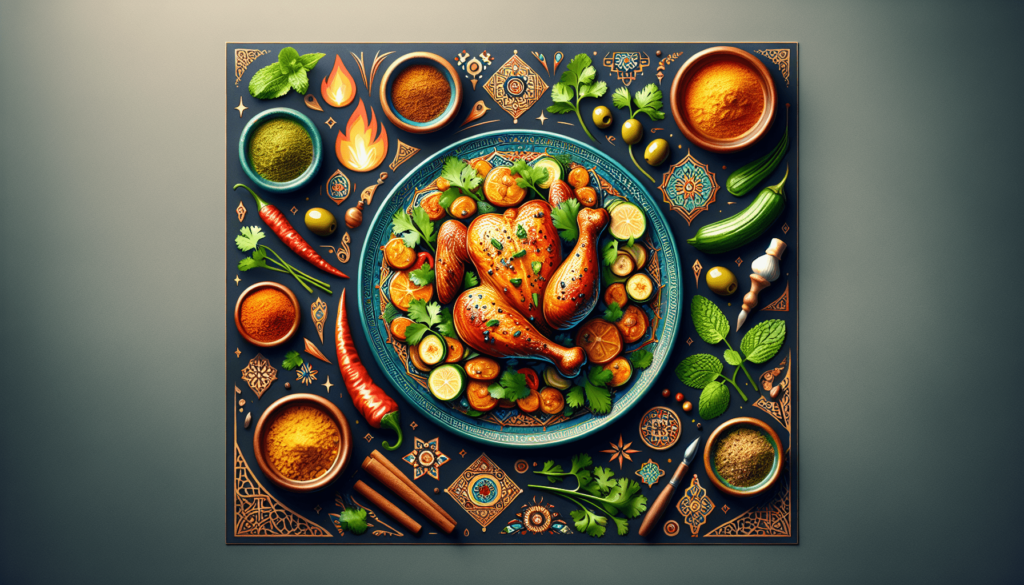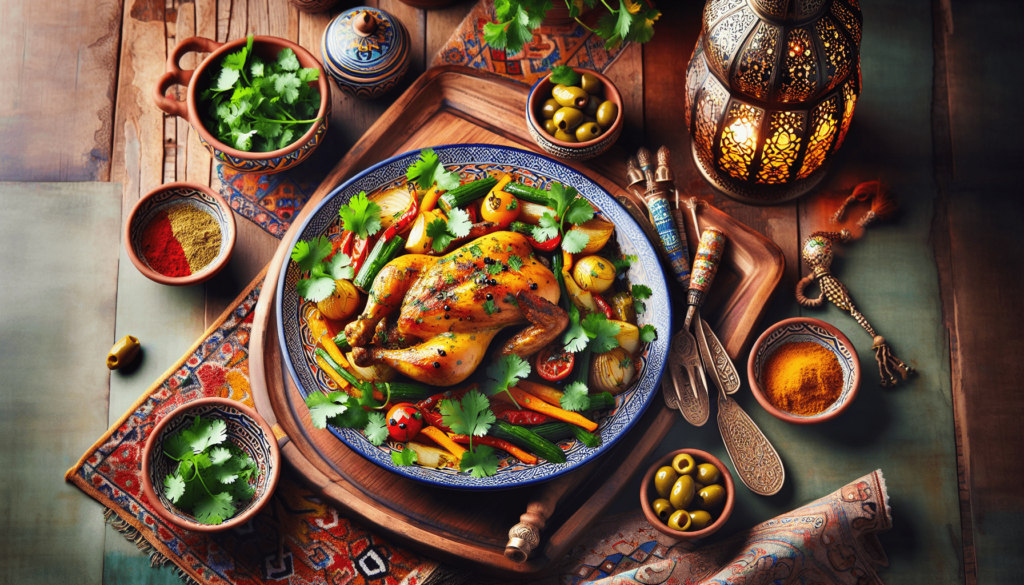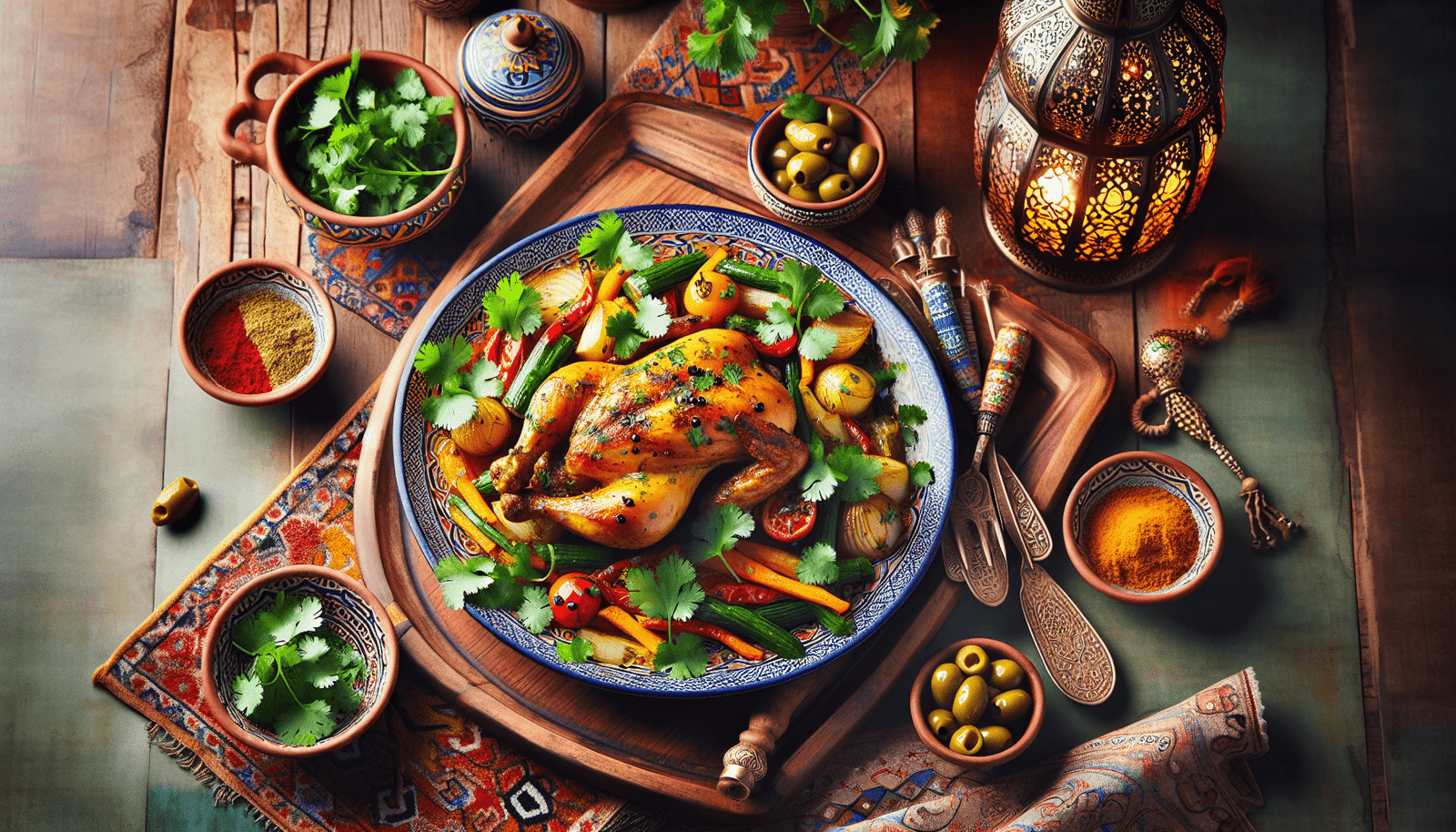Have you ever wondered how to bring a taste of North Africa to your dinner table? Moroccan cuisine is renowned for its bold flavors, a rich mix of spices, and a delightful blend of Mediterranean and Middle Eastern influences. Among the myriad of exquisite Moroccan dishes, the beloved Moroccan Chicken stands out. This delectable dish combines tender chicken with a fragrant medley of spices, making it both exotic and comforting. Whether you’ve tasted it before or are about to venture into this culinary journey for the first time, this article will guide you through mastering an authentic Moroccan Chicken recipe.
Understanding Moroccan Cuisine
Before diving into the recipe, let’s take a moment to understand the rich history and culture of Moroccan cuisine. Originating from a mix of Berber, Arab, and Mediterranean traditions, Moroccan dishes often feature an artful combination of fruits, vegetables, spices, and protein. The food is as diverse as its culture, reflecting the country’s vibrant history and geography. Spices play a crucial role, with common ones including cumin, coriander, saffron, and turmeric. Each dish is a reflection of Morocco’s heritage, where every bite tells a story.
The Importance of Spices
Spices are the heart and soul of Moroccan cooking. They not only enhance the flavor but also provide a colorful visual appeal. For Moroccan Chicken, the key spices you’ll frequently encounter are:
- Cumin: Provides an earthy and warm flavor.
- Turmeric: Adds a bright yellow color and subtle bitterness.
- Cinnamon: Offers sweetness with a woody aroma.
- Ginger: Brings a spicy warmness.
- Saffron: Known for its unique taste and golden hue.
These spices not only contribute to the rich flavor but also have numerous health benefits, including anti-inflammatory properties.
Moroccan Chicken: The Essential Elements
Moroccan Chicken traditionally features chicken pieces cooked to perfection in a rich, aromatic sauce. This dish usually comes together with vegetables, dried fruits, and sometimes olives, which add layers of flavor and texture. The result is a harmony of tastes that showcases sweet, savory, and spicy notes. Let’s break down the key elements of this iconic dish.
Ingredients You’ll Need
Here’s a comprehensive table listing essential ingredients to create Moroccan Chicken:
| Ingredient | Purpose |
|---|---|
| Chicken | Main protein, traditionally thigh or drumstick pieces |
| Onion | Provides sweetness and depth of flavor |
| Garlic | Enhances the savory taste |
| Ginger | Adds warmth and a spicy tang |
| Cumin | Earthy spice essential for authentic flavor |
| Turmeric | Adds color and subtle bitterness |
| Cinnamon | Sweet and aromatic |
| Saffron | For aroma and color (can be expensive, saffron alternatives exist) |
| Chicken stock | Forms the base of the sauce |
| Lemon (preserved) | Adds tang and a unique salty flavor |
| Green olives | For a briny, contrasting taste |
| Dried fruits (apricots or dates) | Introduces natural sweetness |
| Fresh herbs (cilantro or parsley) | For garnish and fresh flavor |
| Olive oil | Used for sautéing and adds richness to the dish |
Preparing the Ingredients
Preparation is key in Moroccan cooking. Begin by marinating the chicken with your mix of spices. This step ensures that the flavors penetrate the meat, making it juicy and flavorful. Chop the onions finely to form a base for your sauce. Garlic and ginger can be minced to release their intense flavors. If using preserved lemons, make sure to rinse them to balance their intense saltiness.
Cooking Techniques
When cooking Moroccan Chicken, there are specific techniques that help to achieve its authentic texture and flavor. Traditional Moroccan dishes are often cooked in a tagine, a type of earthenware pot designed to slow-cook the food. If you don’t have a tagine, a heavy-bottomed pot or Dutch oven will work just fine.
- Sautéing: Start by sautéing the onions, garlic, and ginger in olive oil until softened. This releases their flavors into the oil, creating a base for the sauce.
- Simmering: Once the chicken and spices are added, simmering allows the flavors to meld together over low heat.
- Braising: The method of cooking chicken in a small amount of liquid, covered, which keeps the meat tender and infused with spices.

Mastering the Moroccan Chicken Recipe
Let’s put everything together with a step-by-step guide to making Moroccan Chicken.
Step 1: Marinate the Chicken
Start by marinating the chicken with a blend of ground cumin, turmeric, cinnamon, ginger, and a pinch of salt. Coat the chicken pieces thoroughly to ensure even marination. Allow it to marinate for at least an hour or overnight in the refrigerator for the best results.
Step 2: Prepare the Flavor Base
In your cooking pot or tagine, heat olive oil over medium heat. Add finely chopped onions, minced garlic, and fresh ginger. Sauté until the onions become translucent. This step intensifies the flavors and begins the sauce.
Step 3: Brown the Chicken
Increase the heat slightly and add the marinated chicken to the pot. Brown each piece on both sides. This technique not only seals in the juices but also adds depth to your sauce.
Step 4: Add Liquid and Saffron
After browning, reduce the heat and add chicken stock, just enough to cover the chicken partially. Sprinkle a few strands of saffron into the liquid. Saffron will impart a distinct aroma and deepen the color of the sauce. Cover the pot and let it simmer gently.
Step 5: Introduce Sweet and Salty Elements
As the chicken cooks, add halved preserved lemons and pitted green olives into the mix. This will introduce a tangy, briny element. If you love the contrast of sweet flavors, add a handful of dried apricots or dates.
Step 6: Simmer to Perfection
Allow the contents to simmer until the chicken is cooked through and the sauce has thickened. This should take about 30-45 minutes. Ensure you’re checking occasionally and stirring gently to keep the flavors well distributed.
Step 7: Finishing Touches
Before serving, check for seasoning. Adjust salt and spices if necessary. Garnish with freshly chopped cilantro or parsley, which adds freshness and color to your dish.
Serving Suggestions
Moroccan Chicken is traditionally served with couscous, a light, fluffy grain, which soaks up the flavorful sauce. Alternatively, you could serve it with rice or crusty bread. For a complete meal, consider adding a Moroccan-style salad or vegetables as a side dish.
Couscous Recipe
Preparing couscous is simple and quick, making it a perfect accompaniment:
- Boil water or chicken stock, equal to the volume of couscous you plan to prepare.
- Remove the pot from the heat and stir in the couscous, covering it to let it steam for five minutes.
- Fluff the couscous with a fork, adding a drizzle of olive oil or a knob of butter for flavor. Season with salt to taste.

Health Benefits of Moroccan Chicken
This dish isn’t just a treat for your taste buds; it holds numerous health benefits. The spices used are known for their healing properties—for instance, turmeric and ginger are acclaimed for their anti-inflammatory effects. The inclusion of heart-healthy olive oil and lean protein from the chicken makes this a balanced meal.
Nutritional Overview
To get a clearer picture of Moroccan Chicken’s nutritional benefits, here’s a quick breakdown:
| Component | Benefit |
|---|---|
| Chicken | High protein content for muscle repair |
| Olive Oil | Healthy fats beneficial for the heart |
| Spices (Turmeric, Ginger) | Anti-inflammatory and antioxidant |
| Onions and Garlic | Support immune health and have detoxifying properties |
Tips for Recipe Success
Creating the perfect Moroccan Chicken doesn’t require expert skills, but these tips can ensure you achieve the very best flavors:
- Control the Heat: Keep the heat low to prevent burning the spices which can lead to bitterness.
- Resting Time: Allowing the cooked dish to rest for a few minutes before serving can help the flavors to meld further.
- Adjusting Flavors: Feel free to tailor the sweetness or acidity to your taste preference by adjusting the amount of dried fruits or preserved lemons.
- Experimenting with Spices: Don’t hesitate to play around with spice levels; every Moroccan household has its own twist on the classic.
Conclusion
As you embark on making Moroccan Chicken, remember that cooking is an adventure of tastes and aromas. You’re about to create a dish steeped in tradition, colorful and full of character. Each step you take in crafting this dish brings a little bit of Morocco into your kitchen. Enjoy the savory depth, the hint of sweetness, and the fragrant spices. By following these pointers and techniques, you’re sure to prepare a Moroccan masterpiece that dazzles your dinner guests and transports them to the enchanting souks of Marrakech. Bon appétit!
Some of the links on this site are affiliate links, which means I may earn a small commission if you click on them and make a purchase, at no additional cost to you. As an Amazon Associate, I earn from qualifying purchases.



